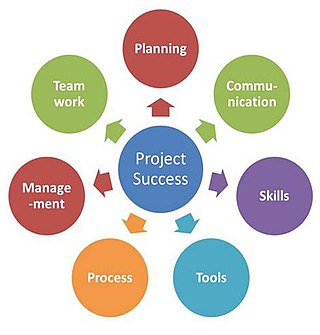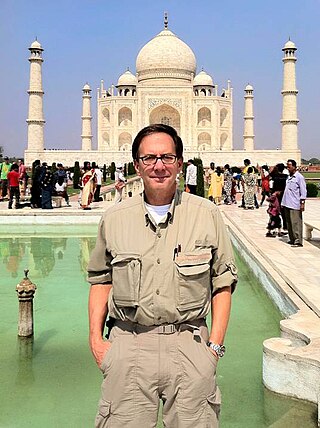Six Sigma (6σ) is a set of techniques and tools for process improvement. It was introduced by American engineer Bill Smith while working at Motorola in 1986.
Succession planning is a process and strategy for replacement planning or passing on leadership roles. It is used to identify and develop new, potential leaders who can move into leadership roles when they become vacant. Succession planning in dictatorships, monarchies, politics, and international relations is used to ensure continuity and prevention of power struggle. Within monarchies succession is settled by the order of succession. In business, succession planning entails developing internal people with managing or leadership potential to fill key hierarchical positions in the company. It is a process of identifying critical roles in a company and the core skills associated with those roles, and then identifying possible internal candidates to assume those roles when they become vacant. Succession planning also applies to small and family businesses where it is the process used to transition the ownership and management of a business to the next generation.

John Francis Welch Jr. was an American business executive. He was chairman and CEO of General Electric (GE) between 1981 and 2001.
Micromanagement is a management style characterized by such behaviors as an excessive focus on observing and controlling subordinates and obsession with details.
Middle management is the intermediate management level of a hierarchical organization that is subordinate to the executive management and responsible for "team leading" line managers and/or "specialist" line managers. Middle management is indirectly responsible for junior staff performance and productivity.
Kaizen is a concept referring to business activities that continuously improve all functions and involve all employees from the CEO to the assembly line workers. Kaizen also applies to processes, such as purchasing and logistics, that cross organizational boundaries into the supply chain. It has been applied in healthcare, psychotherapy, life coaching, government, manufacturing, and banking.

Fidelity Investments, commonly referred to as Fidelity, earlier as Fidelity Management & Research or FMR, is an American multinational financial services corporation based in Boston, Massachusetts. The company was established in 1946 and is one of the largest asset managers in the world with $4.3 trillion in assets under management, and, as of December 2022, their assets under administration amount to $10.3 trillion. Fidelity Investments operates a brokerage firm, manages a large family of mutual funds, provides fund distribution and investment advice, retirement services, index funds, wealth management, securities execution and clearance, asset custody, and life insurance.

S.M.A.R.T. is an acronym used as a mnemonic device to establish criteria for effective goal-setting and objective development. This framework is commonly applied in various fields, including project management, employee performance management, and personal development. The term was first proposed by George T. Doran in the November 1981 issue of 'Management Review', where he advocated for setting objectives that are Specific, Measurable, Assignable, Realistic, and Time-bound—hence the acronym S.M.A.R.T.
Organizational behavior or organisational behaviour is the: "study of human behavior in organizational settings, the interface between human behavior and the organization, and the organization itself". Organizational behavioral research can be categorized in at least three ways:

Critical success factor (CSF) is a management term for an element that is necessary for an organization or project to achieve its mission. To achieve their goals they need to be aware of each key success factor (KSF) and the variations between the keys and the different roles key result area (KRA).
Patrick Lencioni is an American author of books on business management, particularly in relation to team management. He is best known as the author of The Five Dysfunctions of a Team, a popular business fable that explores work team dynamics and offers solutions to help teams perform better. In addition to Five Dysfunctions of a Team, he has written eleven other business books. He has also applied his management techniques to families in The Three Big Questions for a Frantic Family.
Organizational ethics is the ethics of an organization, and it is how an organization responds to an internal or external stimulus. Organizational ethics is interdependent with the organizational culture. Although it is to both organizational behavior and industrial and organizational psychology as well as business ethics on the micro and macro levels, organizational ethics is neither organizational behavior nor industrial and organizational psychology, nor is it solely business ethics. Organizational ethics express the values of an organization to its employees and/or other entities irrespective of governmental and/or regulatory laws.
Talent management (TM) is the anticipation of required human capital for an organization and the planning to meet those needs. The field has been growing in significance and gaining interest among practitioners as well as in the scholarly debate over the past 10 years, particularly after McKinsey's 1997 research and the 2001 book on The War for Talent. Although much of the previous research focused on private companies and organizations, TM is now also found in public organizations

Stericycle is a compliance company that specializes in collecting and disposing regulated medical waste, such as medical waste and sharps, pharmaceuticals, hazardous waste, and providing services for recalled and expired goods. It also provides related education and training services, and patient communication services. The company was founded in 1989 and is headquartered in Bannockburn, Illinois, with many more bases of operation around the world, including Medical waste incinerators in Utah and North Carolina.
Job performance assesses whether a person performs a job well. Job performance, studied academically as part of industrial and organizational psychology, also forms a part of human resources management. Performance is an important criterion for organizational outcomes and success. John P. Campbell describes job performance as an individual-level variable, or something a single person does. This differentiates it from more encompassing constructs such as organizational performance or national performance, which are higher-level variables.
Cross-cultural psychology attempts to understand how individuals of different cultures interact with each other. Along these lines, cross-cultural leadership has developed as a way to understand leaders who work in the newly globalized market. Today's international organizations require leaders who can adjust to different environments quickly and work with partners and employees of other cultures. It cannot be assumed that a manager who is successful in one country will be successful in another.

Mark Goulston was an American psychiatrist, executive coach and consultant who had worked with Fortune 500 companies, universities, and other organizations. He was the inventor and developer of the process called Surgical Empathy whereby using targeted and focused empathy, one is able to break through to people and free them from internal emotional and psychological blocks that can impair their functioning, well-being and satisfaction in life. He died on December 30, 2023.

Robin Sharma is a Canadian writer, best known for his The Monk Who Sold His Ferrari book series. Sharma worked as a litigation lawyer until age 25, when he self-published MegaLiving (1994), a book on stress management and spirituality. He initially also self-published The Monk Who Sold His Ferrari, which was then picked up for wider distribution by HarperCollins. Sharma has published 12 other books, and founded the training company Sharma Leadership International.
Peter Economy is an American author, editor, and ghostwriter. Although his most-recent books tend to reside in the technology genre—particularly software product development and AWS/cloud—he has written books in a variety of other genres, including leadership, management, memoir, biography, consulting, how-to, entrepreneurship, marketing, sales, and a children’s book. Economy is The Leadership Guy on Inc.com where he has published more than 1,500 articles on a variety of topics related to leadership, management, and other business topics.

Venanzio "Vince" Molinaro is a business strategist and leadership adviser. He is the author of several books, including Accountable Leaders. Molinaro is the reference founder and CEO of Leadership Contract Inc.







